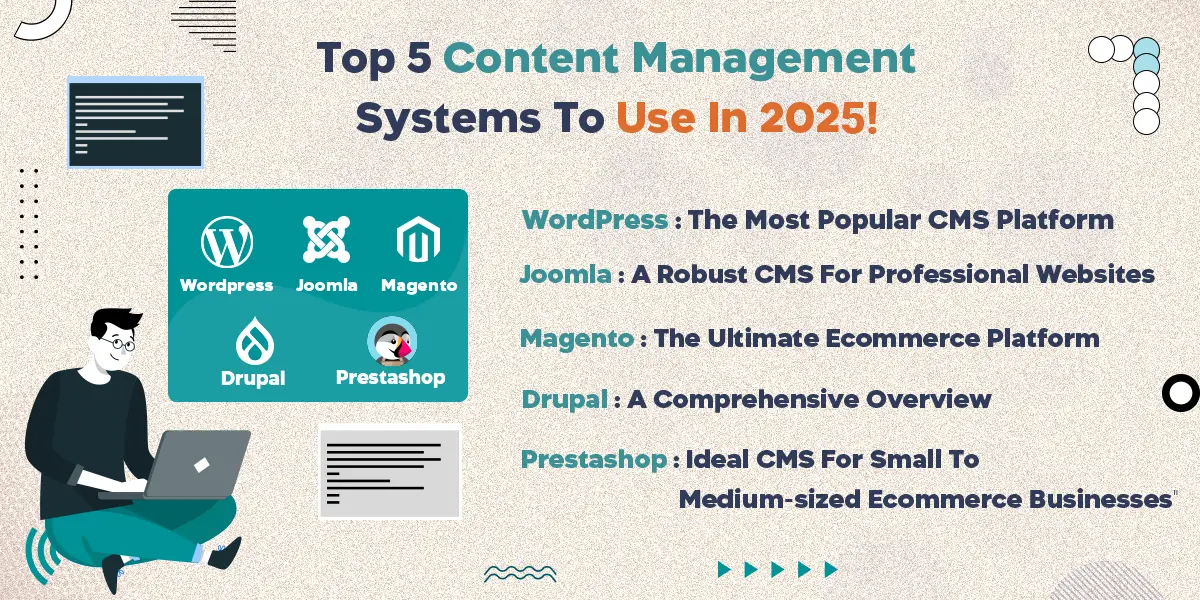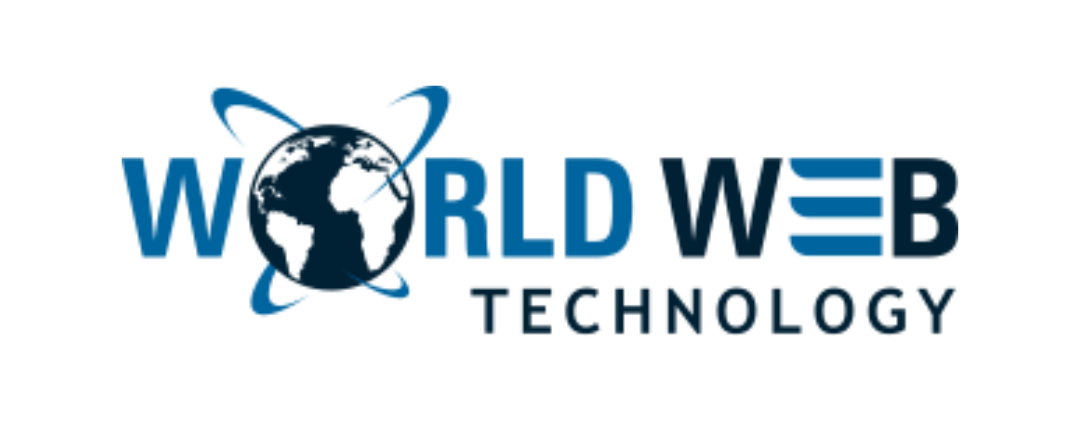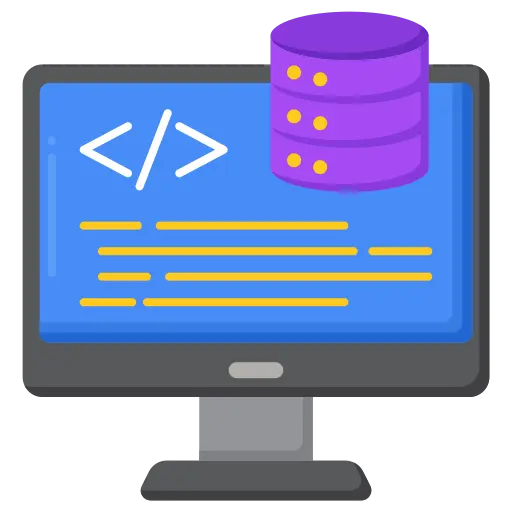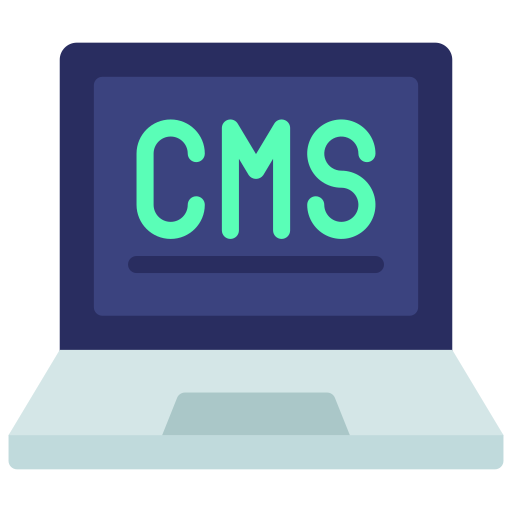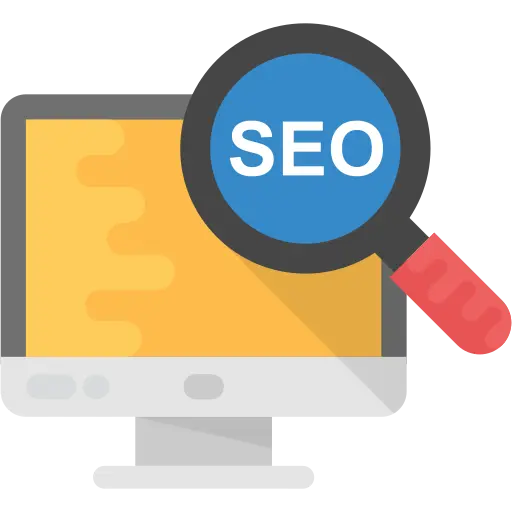It’s interesting to note that many of the CMS systems available today started as simple blogging platforms. Nowadays, the best CMS platforms have evolved into website builders, web hosts and e-commerce platforms all rolled into one. Although a CMS’s primary function is content and media management for a web development company, it should also provide additional benefits such as low monthly costs, search engine optimization (SEO) tools and customization options.
We’ve done the legwork and compared the top CMS systems so that you can find the one that best suits your specific needs – whether you’re selling products online, providing services or information to customers, or promoting a blog.
How do you choose the right CMS platform?
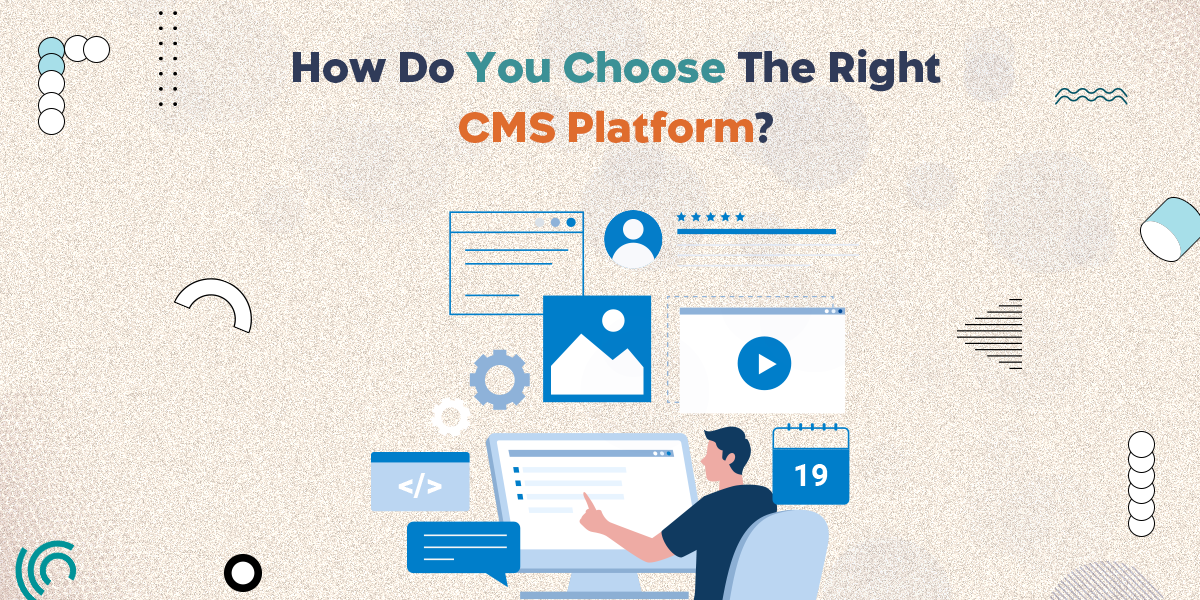
When choosing a CMS system, there are a few things to remember. First, consider the type of website you want to create. Are you planning on selling products online? If so, you’ll want a CMS that has built-in e-commerce functionality. Or are you simply looking to create a blog or informational website? In that case, a more straightforward CMS like a blogging platform may suffice; you may try WordPress development services.
Another significant factor to contemplate is customization options. You’ll want a CMS that easily customizes your website to fit your aesthetic and brand. Look for a CMS that offers several templates and themes and can customize fonts, colors, and layouts.
Finally, cost is always a consideration. While some CMS systems can be expensive, many options are available. Look at the pricing plans for each CMS you’re considering and ensure it fits your budget. With so many CMS systems available today, it can be overwhelming to choose the right one. But with some research and consideration, you can find the CMS that best fits your needs and helps you create the website you’ve always wanted. Review the top 5 CMS platforms ideal for project owners in 2025!
Top 5 Content Management Systems to Use in 2025!
1. WordPress: The Most Popular CMS Platform
WordPress is open-source software that has become the most prevalent CMS platform ideal for a Web Development Company, used by more than 43.2% of all websites. Its scalability and flexibility have made it a popular choice among users. With over 58,000 plugins provided by WordPress, users can create any website they desire, especially with the help of a custom WordPress Development Company.
WordPress is an excellent option for you whether you are starting a personal blog or creating a multi-functional website using WordPress development services. For instance, Sony Music is a noteworthy example of a WordPress site. It elaborates on showcasing images and videos trending on the featured list.
Pros:
- WordPress is cost-effective and can be customized according to individual needs and budgets.
- Users can access a vast gallery of free WordPress plugins and themes.
Cons:
- Not all WordPress themes and plugins are high-end, user-friendly and reliable.
- WordPress lacks personal customer support, relying instead on forums, tutorials and documentation.
Key Features:
- User management: It provides access and roles to variant types of users, including subscribers, authors, editors, contributors, and administrators.
- Built-in comments: This platform allows readers and website viewers to comment on posts and pages.
- Media management: It includes captions and alt text when adding images to boost SEO for your business.
Pricing:
Users must purchase web hosting and a domain name for free WordPress software. Some hosting companies provide both in a single plan. WordPress Hosting offers three plans:
- Premium plans: ₹149/month
- Business plans: ₹269/month
- Cloud Startup plans: ₹699/month
2. Joomla: A Robust CMS for Professional Websites
Joomla is a popular open-source CMS that operates over 2% of websites online. For all those who are non-technical Joomla users, the initial setup may be thought-provoking. However, Joomla’s core software offers a broader range of functionality, including functional, multilingual features, compared to other content management systems. If you have a professional website, Joomla is the best option for you – it offers a multi-user management option. It is an excellent option for a Web Development Company. For instance, Joomla is used on Roger Federer’s website, which features an online store, a news portal and a portfolio.
Pros:
- You can manage a website site with several sub-pages in an effective manner.
- It also provides the highest levels of security with its 2-factor authentication system.
- The projects are well-secured on Joomla as it avoids unwanted break-ins.
Cons:
- Web development terminology featured in the control panel is not user-friendly, especially for beginners.
- The lack of compatibility between modules, extensions, and plugins makes it a No-No.
Key Features:
- Multilingual setting: 70+ languages are available in Joomla for the websites to use across platforms and its core software.
- Convenient search: Joomla helps site visitors find accurate information and data for the website using an intelligent search feature or built-in search tool.
- Easy advertising: Using the ads banner management tool in Joomla, you can create advertising campaigns to monetize the website.
Pricing:
Just like the WordPress platform, Joomla provides optimized plans for hosting services:
- Single plan: ₹69/month
- Premium plan: ₹149/month
- Business plan: ₹269/month
3. Magento: The Ultimate eCommerce Platform
Versatile and highly secured, the Magento eCommerce platform is an excellent tool for customization, SEO and security. It is an ideal option for ecommerce, large-scale shops that get high-volume orders daily, and those with several products to display. Magento’s robust functionalities and features assist project owners in creating a customized shopping experience for their end users.
Magento also boosts SEO capabilities by improving the site’s credibility on search engines. Additionally, this CMS software offers secured transactions using payment options such as Braintree and PayPal. For instance, the official website of Olympus uses Magento, which deals in binoculars, audio equipment, and cameras.
Pros:
- You may manage large-scale ecommerce stores anywhere, anytime with the Magento platform.
- It eases the access process across currencies, locations, and languages.
- This CMS system is an excellent option for operating websites on different browsers and screens – this platform is mobile-friendly.
Cons:
- Magento is a complicated software to set up, especially if you aren’t technically sound.
- Product list and feature customization is very time-consuming on Magento.
Key Features:
- Checkout: Magento uses Cybersource and Worldpay to offer secured checkout on its payment gateway.
- Touch-friendly: The platform graces technology, making its dashboard touch-sensitive. You can now make easy edits on the admin’s backend.
- Catalogue management: This CMS allows showcasing multiple products effectively using inventory management. It allows you to create products immediately, along with vibrant pricing options.
Pricing:
Just as Magento has three different versions, so are their prices. Web development companies can use this open-source CMS for free; however, it needs a custom domain and web-hosting provider to operate. If you wish to enjoy the premium version of the Magento platform, below are the paid plans:
- KVM 1: ₹449/month
- KVM 2: ₹659/month
- KVM 4: ₹949/month
- KVM 8: ₹1699/month
4. Drupal: A Comprehensive Overview
Drupal is a CMS platform designed for web experts in the IT industry. Be it various digital platforms or languages, Drupal’s flexible API architecture supports them all. This CMS software offers built-in features optimized for total security and top-notch site performance. Drupal is ideal for professional, advanced users who wish to show expertise in designing complex, large-scale websites. Web developers must have sound technical knowledge as these websites will receive higher web traffic than sites made using other CMS platforms.
Pros:
- Conducts regular security tests, making your website minimally vulnerable to online threats.
- The built-in, automated module of Drupal assists experts in expanding the website’s functionality.
Cons:
- Operating Drupal isn’t a layman’s job; it needs core coding skills in CSS, HTML and PHP.
- Drupal is a time-consuming CMS platform; for instance, you need extra, sufficient time for new version upgrades.
Key Features:
- Personalization: This platform uses data from browsing history, geo-location, behavior taxonomies, and device types to create a customized client experience.
- Marketing automation: You can boost website reach using an additional feature of automated marketing campaigns.
- Multilingual: Drupal software supports around 100+ languages using automated language translation.
Pricing:
Drupal software’s pricing depends on the domain name and the website hosting. Drupal’s hosting plans provide a free domain, which includes:
- Premium plans: ₹149/month
- Business plans: ₹269/month
5. Prestashop: Ideal CMS for Small to Medium-Sized Ecommerce Businesses
PrestaShop CMS tool is for small to medium-sized businesses on the online platform. Its distinctive features and active community make it a highly flexible platform for online store management. This is why it stands out from the rest. As a web development company, you can easily add, edit and monitor products using the comprehensive interface. For instance, the official website of Harry Fay uses the Prestashop ecommerce platform; it is a jewelry store in the UK that sells designer rings and wedding bands online.
Pros:
- Thanks to the comprehensive features Prestashop offers, you can create a user-friendly and professional online store.
- Prestashop offers distinguished themes and several modules for site customization.
- This CMS software offers integration capabilities to attract site visitors on popular search engines and social media platforms.
Cons:
- Prestashop’s lack of scalability reduces the growth of online businesses to get bigger.
- This CMS software can cost you tons as it depends on plugins and extensions.
Key Features:
- Multiple-Level Ecommerce Management: You can manage multiple online stores using a signal CMS, which shares the same features and components.
- SEO Management: You can easily manage Meta descriptions, titles and URLs to optimize content, making it SEO-friendly.
- Payment options: You can choose from a variety of payment getaways, which include offline processing, PayPal, WorldPay, Stripe, and Skrill.
Pricing:
PrestaShop CMS is free but requires a domain name and web hosting services. You can get such services from a web development company. To enjoy the premium versions of PrestaShop, please have a look below:
- Business: ₹269/month
- Cloud Startup: ₹699/month
- Cloud Professional: ₹999/month
Conclusion!
After introducing several CMS systems across the World Wide Web, it’s time to give you the clear winners of the CMS software race, especially the ones that a web development company would prefer. Although we have mentioned the top 5, we have two winners: WordPress and Magento.
WordPress development services offer a more pervasive platform of themes and plugins than other CMS platforms. You can create any website if you are using the WordPress platform. Magento has excellent scalability and tools ideal for large-scale ecommerce projects; therefore, it is meant to be on the top regarding product and inventory management. Now that you have all the information make the most suitable decision for your next project.
Frequently Asked Questions
CMS website is easy to operate, especially if you are not a programmer. You don't require coding knowledge to manage website content such as creating, editing, publishing and blog posting.
CMS has been highly popular recently; several CMS developers are in the market, and you can hire them. Various web development companies can allow you to hire dedicated web developers at affordable prices.
When updating CMS platforms and websites, you can update the new patch on the dashboard from the core version. It is simple and easy. The CMS platform is easy to use and does not require professional assistance. Using a content management system, you can easily create a user-friendly and SEO-friendly website.
With CMS, you can develop informative sites and an ecommerce website that can generate profits for your business. For instance, when you hire a custom WordPress development company, they use several plugins and features to develop your ecommerce website.
There is always a method of using a CMS platform; websites managed by CMS platforms are safe when you use it correctly. You must keep the core version of the software updated to ensure the website security and content privacy are up to date, as security updates come frequently.
Most Popular Categories
Discover top categories on our blog, featuring WordPress, PHP, eCommerce, and Shopify insights and tutorials.
Featured Insights
Immerse yourself in our passion for sharing the latest industry news, cutting-edge technologies, and insightful articles. Explore the depths of knowledge with us.
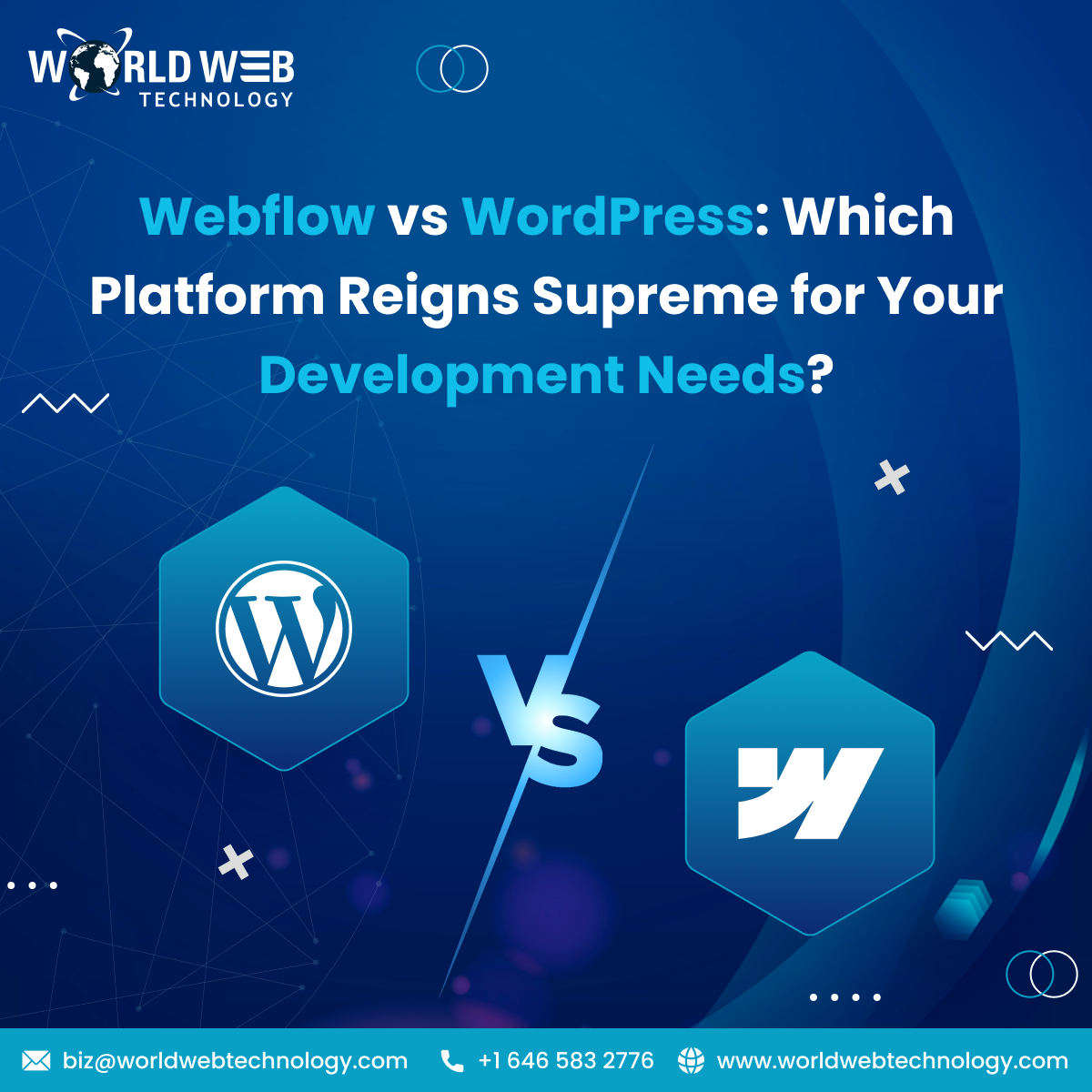
August 19, 2025
Webflow vs WordPress: Which Platform Reigns Supreme for Your Development Needs?

May 22, 2025




